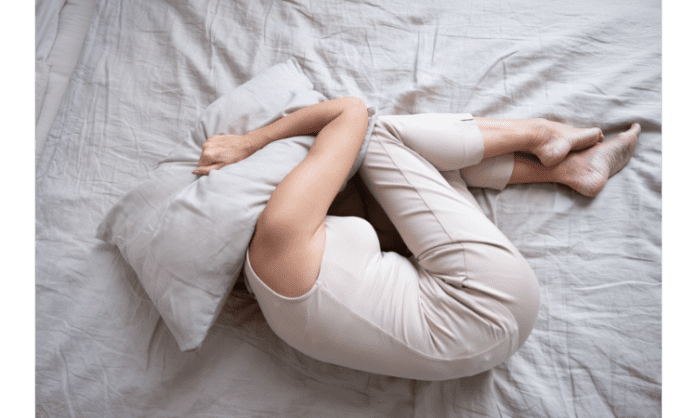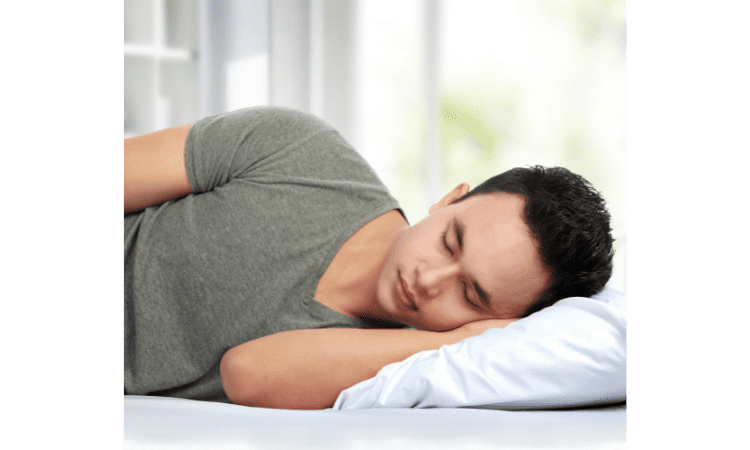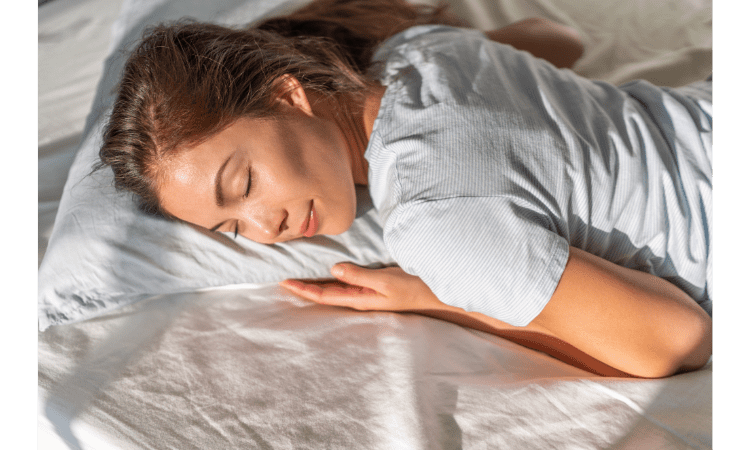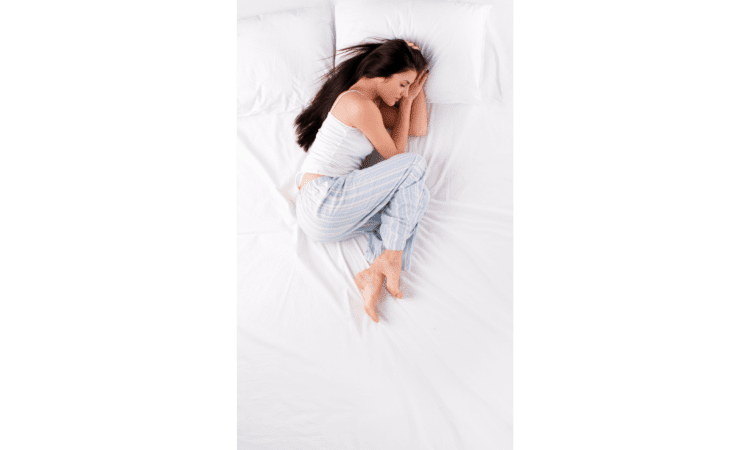
Have you ever wondered how your sleep position affects your health and well-being and what is the healthiest sleeping position? sleeping posture like sleeping on your back, stomach, or side can impact how you feel when you wake up, how much you snore, and even whether or not you’ll develop back pain. Check out our list of the best sleep positions and their benefits below.
Sleeping on your back

Sleeping on your back is ideal for many people, especially if you snore or have sleep apnea. The weight of your body compresses the rib cage and keeps it from collapsing inward (a common problem for those with a herniated disc). It also prevents you from rolling onto one side or another.
If you lie flat on your back, gravity will keep blood flowing to all parts of the body: legs and arms included! This can help improve circulation in these areas and reduce swelling as well as pain caused by poor circulation.
By sleeping with limbs slightly elevated above shoulders/hips in an elevated position (think pillow), this effect is even more powerful because it allows “sludge” that might pool under veins during sleep (due to lack of movement) to drain away naturally instead of being trapped there causing clots which may cause health issues later down the road including varicose veins – hence why many doctors recommend elevating both hips when lying down even though only one leg has been injured due to being immobile while resting at home after surgery or something similar… 🙂
Sleeping on your side

Sleeping on your side is one of the best sleep positions for proper sleeping. It’s a healthy position to sleep and your body is able to relax more when you sleep on the side, and this helps ease tension in the spine, making it easier for you to breathe.
Sleeping on your side also helps with digestion, as it allows food and liquids to move through your digestive system in a more efficient manner. It’s also been shown that sleeping on your left side can reduce snoring and even heartburn symptoms!
Finally, if you suffer from insomnia or headaches, sleeping on your right or left side will give you relief after just one night and have natural sleeping!
Sleeping on your stomach

- Sleeping on your stomach is not recommended. This sleep style can cause neck pain and back pain and can contribute to snoring, acid reflux, and sleep apnea.
- When you’re sleeping face down, the weight of your head will put strain on the muscles in your neck and shoulder area. This can contribute to tension headaches or migraines when done repeatedly over time. It’s also likely that you’ll wake up with a stiff neck because of this position—and if there’s one thing we’ve learned about sleeping habits, it’s that waking up stiff every morning isn’t ideal!
- The blood flow to the brain is restricted in this position as well—especially if you’re a stomach sleeper who tosses and turns throughout the night (which many do). This can lead to poor quality of rest or even an inability for some people to get into deep sleep at all without changing their position!
Sleep in the fetal position

Sleeping on your side, back and stomach can all have benefits for your health. Sometimes, sleeping in the fetal position is also a good way to get restful sleep and has been shown to be beneficial for some people who are trying to lose weight or snore.
The best heart health sleeping positions are based on several factors including: body size, how much you move during sleep and where you like to sleep (with or without a pillow).
- A person’s height, weight and whether they’re male or female are important factors when deciding which position makes them feel most comfortable while resting. If they prefer lying flat on their back with no pillow then this may be more suitable than if they were tall with broad shoulders; therefore needing more support from under the head area than someone who isn’t as big framed as them would need.*
Best sleep position to lose weight

- Sleeping on your back burns the most calories, with an estimated 100 (or more) expended per hour while you’re snoozing.
- Sleeping on your side is the least effective way to burn calories, burning about 80 per hour.
- You must be surprised to know that sleeping on your stomach burns about 125 calories per hour, which may be why some people who sleep that way tend to have lower body fat levels than those who lie on their sides or backs during slumber time (although this could also be due to other factors).
Best sleep positions to stop snoring

- Sleeping on your back is one of the best positions to stop snoring. It allows the airways to open up and move freely, which helps reduce snoring.
- Some people love to sleep on the side. Sleeping on your side is also helpful for reducing snoring because it keeps the nasal passages open and makes breathing easier.
- If you are sleeping on your stomach, it can cause sleep apnea, which prevents you from getting enough oxygen while you sleep and can lead to heart problems in the future. It’s not recommended because it places pressure on the throat and chest area, making it difficult for you to breathe easily while asleep.
- The fetal position may help some people with their snoring issues but should be avoided if there are other symptoms associated with obstructive sleep apnea (OSA).
The Best Heart Health Sleeping Positions

- On your back: Sleeping on your back is the best position for heart health because it helps to prevent snoring and upper back pain. This sleeping position also allows you to breathe more freely, which means that you’re less likely to wake up in the middle of the night due to shortness of breath.
- On your side: Sleeping on your side is another good choice for healthy hearts because it reduces snoring and improves sleep quality overall. It can also help reduce symptoms of insomnia by allowing for deeper levels of REM (rapid eye movement) sleep during which the body repairs itself most efficiently.
- In a fetal position: The fetal position (also known as “fetal tuck”), while not necessarily recommended by doctors due its potential discomfort factor, may be helpful if you have digestive issues or need some extra circulation in the lower abdomen area after surgery or injury recovery period since it keeps pressure off those areas while still allowing blood flow throughout the rest of your body so that healing can take place properly without interruption from discomfort caused by being moved around too much during physical therapy sessions or recovery periods spent lying flat on a hospital bed instead of being upright at home.
Find a sleeping position that is best for you and your health.

The best sleep positions for your spine is sleeping on your back, with a pillow under the knees. This position aligns the spine and helps distribute pressure evenly throughout your entire body. Sleeping on your side is better than sleeping on your stomach, but if you choose to sleep in this position, make sure that you have a thin pillow between your legs so that they are in line with your torso rather than straight out to either side. Sleeping on the stomach can cause back pain and damage to disks in the lower back from lying flat against a hard mattress.
The best sleep position for neck health is sleeping on one side with a thin pillow between yourself and the wall or headboard (or two pillows if needed). The reason behind this recommendation is that
when we wake up from sleeping face-down all night long, our necks are strained enough as it is—we don’t want any more stress added by having something heavy weighing down our heads! If you prefer lying flat during slumber time then try placing something flat like an old book underneath one shoulder blade so that it doesn’t press into soft tissue while resting face-up all night long; if possible place another small piece directly below chin area since this will help keep airways open while positioned horizontally to have an ideal sleeping position.
Conclusion
Good sleep and correct position to sleep, like good nutrition and exercise, is essential for optimal health and performance. Its good to know how should you sleep because proper sleeping helps your brain work properly by preparing for the day, forming new pathways to help you learn and remember information. It also can affect how well you think, react, work, learn and get along with others. Many people believe that they need less sleep as they age but older people actually require just as much if not more than younger people do.
The best sleep positions for every individual depends on many factors including their lifestyle habits such as alcohol consumption or smoking cigarettes; medication use; physical health conditions such as heart disease or diabetes; mental health disorders including depression or anxiety; genetics like having a family history of insomnia (not getting enough sleep) or hypersomnia (sleeping too much).
Also Read:- Should-You-Put-Your-Bed-Opposite-A-Mirror











